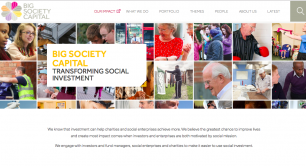Big Society Capital boss answers critics: “We’re part of a Big Solution”
Earlier this week, Richard Litchfield wrote that Big Society Capital's structure – and the implications of that on the cost of finance – is holding back uptake of social investment. CEO Cliff Prior responds
The need for thriving social enterprises and charities in the UK has never been greater – indeed I would say our very future as a country depends on them.
This was demonstrated last week when Social Enterprise UK (SEUK) published its state of the sector report, which highlighted the triple threat of economic stagnation, social division and environmental breakdown and showed how social enterprises are helping tackle these. Fortunately, the sector is thriving – 52% of social enterprises grew last year and 42% have been created in the last five years – in a wave of energy and innovation that is rivalling and often outstripping growth in the purely for-profit business sector, while also tackling deep-seated societal problems.
To continue this vibrant, healthy growth our social sector needs fuel. It needs energetic people and great ideas, but it also sometimes needs affordable finance to enable these to take off. This is where Big Society Capital comes in. Our role is to build the social investment market sustainably and increase the flow of capital so that now and in the future social enterprises can continue to grow their impact. This source of finance, which is essentially a loan that must be paid back eventually, is not right for every organisation and many will never want to access it, but our job is to ensure those who want it and can repay it do get the funds they need.
However, sometimes people ask why, if affordable capital is so urgently needed, Big Society Capital doesn’t simply lend all its money for free or at low cost. That would be very tempting, but there are a couple of very good reasons why this would be a serious mistake.
Firstly, we do lend some of our money at very low interest rates. However, we couldn’t do that with all our funds otherwise we soon wouldn’t have any. This would be like treating a patient’s symptoms: providing immediate pain relief, but not addressing the real underlying problems – which are systemic and prevent finance reaching the whole social sector in the long term. Some enterprises would get cheap money for a few years, but soon we would be back to square one and the sector would be left with more than just a headache. We need to recycle our funds. So, while some of them are lent through our partner funds at low rates, we balance that risk across our portfolio by lending to other parts of the ecosystem at more commercial rates.
Lending all our money at very low interest rates would be like providing immediate pain relief, but not addressing the real underlying problems
A second big reason for carefully balancing the rates we lend at is the need for co-investment. Our role is to grow the market, not just be the market. For every single pound we have lent we have brought in at least two more pounds from other investors alongside us. The result has been to triple the amount of funding available to social enterprises and charities. So far, £1.7bn has been committed by us and co-investors, of which we have contributed £500m. This is money that hasn’t previously been available to social business. Indeed, our latest estimates suggest that the entire social investment market has been growing 30% year on year, reaching a total of £3.5bn this year (from just £1.5bn in 2015). This would not have happened if we had used our money to crowd out other investors with cheap rates rather than use it to bring them in alongside us. So that means that the price of loans – the interest rate – has to be based on the best deal we can achieve, balancing affordability to social organisations with the willingness of other investors to put their money in.

Above: A sports centre in Bristol, including six state-of-the-art pitches, was refurbished thanks to a group of social investors, with cornerstone investment from Big Society Capital. The pitches allow more space in which to engage young people, and bring in revenue for the centre.
The area where this is most challenging is unsecured debt. Often finance is needed for an asset such as a building or perhaps a van, and then a social business can approach a social bank such as Charity Bank, Triodos or Unity Trust Bank or indeed a commercial provider. But if they need investment for growth in their team, or for working capital, that is likely to be unsecured debt – a loan that is not secured on an asset – and hard to obtain commercially. Because it’s unsecured, it is risky for the investor – they could lose some or all their money – so they will ask for a higher interest rate to cover potential losses. This part of the social investment market makes up a small part (around 10%) of the total, but because it is so important to the sector, we focus on this area and it makes up 40% of our investments.
We are constantly trying to work out how to make money more accessible, including for smaller social organisations who want the smallest loans and for whom this is even more challenging. For the social investor, the transaction cost of making an investment is almost the same whether it’s £50,000 or £500,000, so it really hits affordability. Ironically, that makes small loans more expensive for the organisations who have the least money.
We are constantly trying to work out how to make money more accessible
That’s why we at Big Society Capital worked with The National Lottery Community Fund to create the Growth Fund, run by Access - the Foundation for Social Investment. It provides a blend of grant and loan money into funds offering smaller-scale, unsecured investments to charities and social enterprises, with the grant helping to make that investment easier for them to access. A little over half of investments made through the Growth Fund are £50,000 or less – exactly the figure Social Enterprise UK’s new report highlights as the average amount needed by social enterprises for their first investment. So far Access has helped 335 social enterprises and charities, with a strong bias to organisations based in the most deprived areas of England. And with partners we created Good Finance, an initiative that provides information and support for the social sector and aims to help democratise finance.
The good news is that these initiatives are working. The social investment market has grown massively, and we are confident that more than 4,500 social enterprises and charities are accessing social investment today. The SEUK survey I mentioned showed last week that for the first time in 12 years accessing finance is no longer the biggest obstacle for social enterprises looking to grow. Finance is still a major challenge for many of course, however there has been a substantial increase in the number of social enterprises seeking loans (32%, up from 24% in 2017).
Our vision is that all investment has a positive social impact and improves people’s lives. We have a big responsibility to use the public money we have from dormant bank accounts and our four shareholder banks, and to bring in other funds to achieve lasting change, which will support social enterprises and charities – not just today but for generations to come.
Thanks for reading our stories. As an entrepreneur yourself, you'll know that producing quality work doesn’t come free. We rely on our subscribers to sustain our journalism – so if you think it's worth having an independent, specialist media platform that covers social enterprise stories, please consider subscribing. You'll also be buying social: Pioneers Post is a social enterprise itself, reinvesting all our profits into helping you do good business, better.



